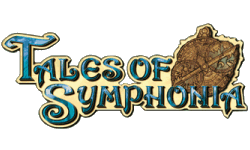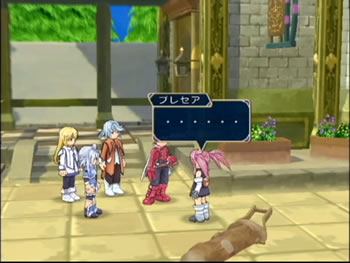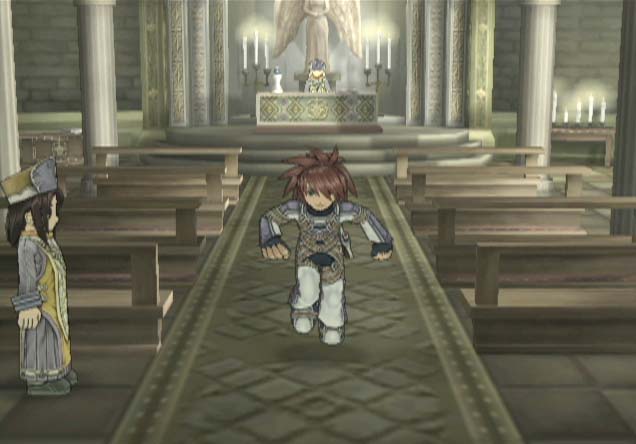|
|

|
PLATFORM
|
GameCube
|
BATTLE SYSTEM
|

|
INTERACTION
|

|
ORIGINALITY
|

|
STORY
|

|
MUSIC & SOUND
|

|
VISUALS
|

|
CHALLENGE
|
Adjustable
|
COMPLETION TIME
|
30-45+ Hours
|
|
OVERALL

|
Click here for scoring definitions
|
|
|
Sylvarant is a dying world, where a prophecy speaks of a Chosen who will revitalize the planet. A boy named Lloyd Irving and his companions will embark on a journey to help the Chosen, Colette, fulfill the prophecy and revive Sylvarant. However, they are unaware that the restoration of their world will come at the expense of another. Tales of Symphonia is the first and only installment of Namco's Tales series to appear on the somewhat-RPG-starved Nintendo GameCube, proving to be one of the system's finest RPGs despite its flaws.
Symphonia is the first installment of the series to dump random encounters in favor of on-screen encounters, where enemies wander both the dungeons and overworld. In dungeons, the active character can stun wandering foes with the Sorcerer's Ring (with some exceptions), and in most instances, it isn't too difficult to dodge them if desired by simply running around them. After contacting an enemy, a battle naturally commences.
As with previous installments, combat is real-time, although battles now move to three dimensions, with the player's characters in whatever positions their A.I. options in the game menus determine. While the player controls one character, the A.I. controls the others, which actually works pretty nicely. Targeting a specific foe will place the controlled character in the same line as that enemy, which the character can approach to execute normal attacks and special skills. All characters can chain together massive combos that can multiply experience after the battle has ended.
 Presea's a lumberjill, she's...emo
Presea's a lumberjill, she's...emo
|
|
When the player's party has landed enough hits against the enemy, he or she can execute a Unison Attack against a single foe, in which all characters perform a special skill against it, and after which the Unison Attack gauge will empty. When a battle ends, the player's party gains experience, money, and, depending upon how well the fight went, Grade Points, which the player can exchange for materials at shops for synthesizing items, and use after beating the game to receive bonuses in a second playthrough. Outside of battle, each character can equip four EX Gems of four different levels that provide certain effects such as increased stats.
The battle system is pretty enjoyable, with most normal battles rarely dragging on and certain boss fights posing a bit of a challenge (with difficulty being adjustable). Unison Attacks can be somewhat tricky to execute, although luckily, mastering them is hardly necessary to complete the game. Overall, there really isn't much to complain about in the battle system, which is easily the game's high point.
The interface is clean for the most part, with easy menus, shopping, controls, and so forth, and a plot synopsis, with a few exceptions, mostly providing players a direction on how to advance the main storyline. Many dungeons also feature puzzles chiefly utilizing the Sorcerer's Ring, whose functions the player can alter within select dungeons. There are some flaws, however, such as the inability to skip cutscenes, though otherwise, interaction doesn't leave a whole lot of room for improvement.
The way in which the battle system of the Tales series makes the leap to three dimensions is fairly inventive, as are other tweaks to combat such as Unison Attacks, EX Gems, and so forth. The story does have some unique ideas, such as a character attempting to become an angel, although the story does borrow heavily from other installments of the Tales series, chiefly Eternia and Phantasia (to which Symphonia is a distant prequel). Still, Symphonia does have enough features to feel fresh.
 Kratos--skilled warrior and break-dancer
Kratos--skilled warrior and break-dancer
|
|
The story, unfortunately, is perhaps the weakest link of Symphonia. Many of the playable characters do contain a history of some sort, although the main plot itself is rather bland and loaded with tired RPG story elements, such as a dying world, tumultuous racial relations, and so forth. Part of the story also involves collecting summon spirits across two worlds in a rehash of Tales of Eternia, and the game filches many plot twists from other RPGs and a few movies. All in all, the plot just doesn't work, and it's obvious that the writers should've given it a thorough once-over.
Motoi Sakuraba, as in most installments of the series, provides the music, which is up to his usual standards, and features many nice tracks such as the military base theme and many town and dungeon themes, as well as remixes of a few tracks from Tales of Phantasia. Most story scenes, moreover, are voice-acted, with the quality of the voicework varying from character to character; while it's a definite step above Eternia's, it certainly isn't superb enough to prevent players from skipping through the dialogue. Still, Symphonia is a fairly decent-sounding game.
The visuals shine as well, with Symphonia marking the franchise's leap to 3-D, with cel-shaded characters and monsters alongside smooth, colorful environments and fluid animation. Still, the world map does have quite a bit of fade-in, and the game is uncreative with the sprites used to represent monster encounters, especially on the overworld, where two types of black tadpoles represent such encounters. Nonetheless, Symphonia is very easy on the eyes.
Finally, Symphonia takes somewhere from thirty to forty-five hours to complete, with a replay mode allowing the player to inherit bonuses from the initial playthrough in the new playthrough via Grade Points. Overall, Tales of Symphonia is another title worthy of the Tales name, with a solid battle system, interface, music, and visuals. Its story is a bit on the hackneyed side, although those more concerned with gameplay will likely have a good time, and really, until you've played Symphonia, then you really haven't played GameCube RPGs.
Review Archives
|









